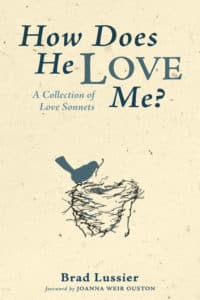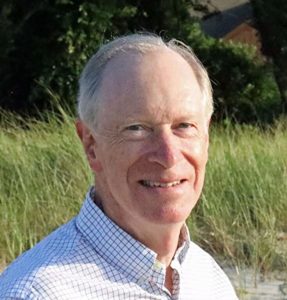When Brad Lussier was studying for his degree in English and American literature at Brown University, he discovered not only the sonnet form of poetry, but also a love for the sonnet. Graduation, family, work, and career intervened, Years later, he joined a local theater company — and there he rediscovered his love for the sonnet.
As he notes in his introduction to his collection of sonnets, How Does He Love Me?, the sonnet has something unusual about it apart from its rhyming and meter scheme. It may be the only poetic form intended for an audience of one. The sonnet is most closely associated with love poetry, and a poet doesn’t write a love poem to multitudes of people. Traditionally, sonnets are all about passion, desire, admiration, adoration, and all the other intense emotions that result from a person’s love for another.
As I read Lussier’s sonnets, I understood something else. I’ve been reading a number of collections of sonnets recently, and I realized they reflect something else in addition to love for another. Their precise “rules” — the number of lines, the number of syllables per line, how the stress falls on the words in a line — demonstrate a love for order and tradition.
Reading and writing a sonnet connects us to the times of William Shakespeare, Edmund Spenser, John Milton, Sir Thomas Wyatt, and Petrarch. Sonnets suggest that some things last. In an age when even grammar rules are suspected to be tools of oppression, the poetic form of the sonnet reminds us that it is still possible for beauty to transcend politics.
Lussier’s sonnets are love poems, but he uses a considerable number of metaphors, themes, and subjects. In addition to describing his own feelings of ardor, these include sparrows, shades of ink and colors, art, summer shadows, prayer, food, times, destinations, and more. The world becomes both a resource to draw upon for his descriptions and a canvas on which to paint the sonnet’s words.
His poems are intensely personal, even for things that might seem fleeting and inconsequential. He explains how something as quick and short as a shared glance across a crowded room can communicate more than anyone not sharing the glance can understand.
Secrets to None Other Known

And inspiration of our breaths we share,
That your one knowing look fast probes my mind,
While in one word I read your every care?
How is it that one gentle touch of hand
Or meeting ‘cross a room of but our eyes
Suffices for our hearts to understand
The need, the pain, the agony, the cries,
That freely we reveal, though not with fear
But boldly, secrets to none other known,
And find our souls’ refreshment waiting near
In one who loves one who once breathed alone?
So rare, this love, for freedom it has wrought
And confidence and strength that it has taught.

Brad Lussier
After receiving his undergraduate degree from Brown University, Lussier worked for an American Baptist church in Rhode Island, received a master’s degree in computer science, and worked as a computer consultant in India and the Philippines. Returning to the U.S., he moved his family to Cape Cod, where he began acting at a local theater company. He received a doctor of ministry degree from Boston University in 2001.
The 47 sonnets of How Does He Love Me? answer the question posed by title. The recipient of these poems can say, “He loves me both close and from afar, in all seasons, no matter how young or old I am, and with feeling so deep it cannot be measured.” The nations and culture around us may pulsate and rage at every new thing, but this love is eternal and unchanging.
Photo by Wesley Eller, Creative Commons, via Flickr. Post by Glynn Young.
__________________________

“I require all our incoming poetry students—in the MFA I direct—to buy and read this book.”
—Jeanetta Calhoun Mish
- Poets and Poems: Mary Brown and “Call It Mist” - September 18, 2025
- “Horace: Poet on a Volcano” by Peter Stothard - September 16, 2025
- Poets and Poems: The Three Collections of Pasquale Trozzolo - September 11, 2025

Megan Willome says
Thanks for introducing another poet of sonnets, Glynn. As I’ve been playing with the form, it seems that sometimes only such a compact form can hold such an immense thing as love.
Glynn says
Next week, I’ll have another take on sonnets – not about love but about everything else.
L.L. Barkat says
In a healthy society, relationship, family, art, and so on, I think it must always be a dance between rules and refashioning, respect for and fascination with established bounds and refashioning the edges of those bounds. Thus, the vital role of the Trickster in literature (and life?) around the world. And also the vital role of genre, form, ritual, traditions of all kinds.
This is where even cultures can be “iron sharpening iron” for one another. I imagine in that sharpening process there can be a sense of pain, or actual harm, as the tools of any trade are used to alternately express or oppress. It makes me wonder, really, what our deepest human fear is… is it about survival? Love? Some people seem born to live on one side or the other of that dance. Others seem to be translators between the sides—facilitators, conversationalists, creators who meld.
The older I get, the more I see the value of the various roles. I feel I can always come to you, Glynn, for the “order” side. Others in my life, they are always out to break the “grammar rules.” I am grateful for both. The “long arc” of survival (and maybe love) seems to need all of it.
Glynn says
What’s funny is that, when I was working, I was officially classified as the “conscientious objector,” the one who not only zigged when the rest of the company zagged but was also at the very heart of a convulsion that upended both the company and the industry. I remember sitting in a group meeting with several executives, and one group vice president, not realizing I was at the table, said, “The damn speechwriters are running the company.” There was a kind of stunned silence, everyone looked at me, and I said, “What the speechwriters do is meaningless unless it’s what the CEO wants.”